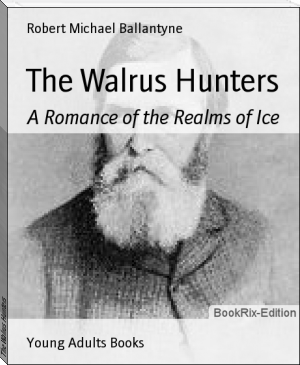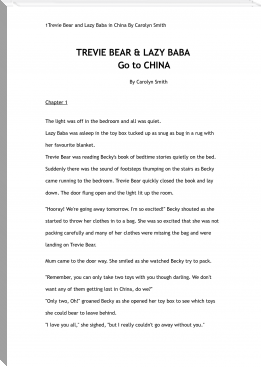The Walrus Hunters - Robert Michael Ballantyne (best book clubs .txt) 📗

- Author: Robert Michael Ballantyne
Book online «The Walrus Hunters - Robert Michael Ballantyne (best book clubs .txt) 📗». Author Robert Michael Ballantyne
But the curiosity of the Eskimos was only whetted by this. They immediately began to clamour for explanations, so that the Indian found himself at last obliged to undertake a lecture on gunnery, as far as he understood it.
"My father," said Cheenbuk, whose respect for the Indian was rapidly deepening, "some of my people want to know if you can kill bears with the spouter."
"Yes, it will kill bears. I killed a white one not long before you found me."
"And will it kill the walrus too?"
"Yes; it will kill the walrus. It kills anything that has life."
There was an expression of great astonishment at this. Some even ventured to doubt it. Then there was a noisy consultation for a few minutes, after which Cheenbuk was told to ask if their guest would go with them then and there to hunt for a walrus.
"Oh yes;" the Indian was quite ready to go, whereupon the men scattered to harness the dogs and make preparation for an immediate hunt.
"Go and get my sledge ready," said Cheenbuk to Anteek.
The boy was only too glad to obey, for the mission implied that he should have a place on the sledge along with the Fire-spouter.
In a very short time several sledges were ready. Nazinred seated himself on one. Cheenbuk and the others jumped in, the whips cracked, and away they went amid the shouting of the drivers and the yells of children and women left behind.
It did not take long to find one of those giants of the frozen seas. Some miles out on the ice they came to a place which the walruses had kept open as a breathing-hole. At the time of their arrival it had not been disturbed for some hours, for the water was covered by a coat of young ice, which was quite able to bear the weight of the men singly, though scarcely sufficiently strong for the sledges.
Just as they arrived a walrus took it into its very thick head to crash up through the young ice and have a gambol. The party retired behind a hummock and prepared for action.
"Will the man-of-the-woods go first and try the spouter?" asked Cheenbuk.
"No," replied Nazinred; "the man-of-the-woods prefers to watch how the men-of-the-ice do their work. After that he will use the spouter, which _we_ call _pasgissegan_. The white traders call it _gun_."
Harpoons and lances were at once got ready.
"Come, Anteek, with me; bring a harpoon and a coil with you. We will show the man-of-the-woods what we can do."
He said this with a look of self-confidence, for Cheenbuk, being a noted hunter among his fellows, was naturally rather proud of his powers.
Waiting until the walrus dived, the Eskimo and his companion ran towards the hole of open water, and then suddenly lay down, for they knew the habits of the brute, and that he would soon reappear. This, in fact, happened before they had lain more than a few minutes. After another gambol the ungainly animal dived again. Up got the two Eskimos and ran at full speed to the very edge of the hole. On rising the third time the walrus found Cheenbuk standing with the harpoon raised. One look of huge astonishment it gave at the man, who instantly drove the harpoon deep into its side, and then ran from the hole as fast as he could, uncoiling the long line of hide until he was some distance off. Then he struck a piece of bone, sharp-pointed, into the ice, and put the loop at the end of the line over it. This checked the dive of the walrus, which in furious rage came up and smashed another hole in the ice, looking fiercely around as if in search of its persecutor. Anteek's opportunity had now come. He ran towards the creature, which, so far from being afraid, smashed up the ice in vain attempts to get upon it. Another harpoon was deftly driven into it, and the boy, running back, fixed his line as the man had done.
These two now began to "play" the walrus, easing off and tightening their lines as required.
Meanwhile the other Eskimos ran forward, and, taking advantage of the creature's combative disposition, fixed several more harpoons in it, besides giving it many severe thrusts with their lances. But the hide of a walrus is nearly an inch thick, and it was not easy to pierce it with an effective thrust. At last, however, they succeeded in killing it after a battle of over three hours.
"That is hard work," observed Nazinred to Cheenbuk, as they stood watching the cutting up and packing of their prize on the sledges, "and takes a long time."
"Come, now, let my father show us what the--the pass--pass-gi--spouter-- gun can do," said Cheenbuk, pointing to his sledge, which Anteek had got ready. "There are more walruses yonder."
He pointed to another hole, not far off, where several were seen rolling about in the water. The Indian stepped on the sledge, the others followed, and in a short time the whole party was concealed behind a hummock close to the hole.
Nazinred now loaded his gun with ball.
"You must first throw a harpoon for fear it should sink," he said, when ready to start.
Without a word Cheenbuk grasped his harpoon and coil and ran forward, for the walrus had dived at that moment. Anteek followed, and Nazinred kept close to both. Once they lay down to let the animal come up and dive again. The moment it did so they ran at full speed as before to the edge of the hole and waited.
"Send it deep in," muttered the Indian.
"I will," replied the Eskimo.
"So will I," thought the boy, but he was too modest to say so.
The thought had barely passed when the walrus came up with a puff and snort that might have been heard a mile off. Cheenbuk's weapon was successfully launched in a moment. So was that of Anteek, though he missed the animal's side, but hit in the neck. Nazinred took quick but sure aim at one of its glaring eyes, and before the smoke of the shot had cleared away the walrus fell over dead with a bullet in its brain.
CHAPTER TWENTY THREE.
A BEAR-HUNT AND A SAD END.
The Indian chief was after this an object of almost veneration to the Eskimo men, of admiration to the women, and of delight to the boys and girls, who highly appreciated his kindly disposition as well as his skill with the spouter.
He was taken out on all their hunting expeditions, and fully initiated into all the mysteries of seals, walrus, deer, and musk-ox killing. Of course the wonderful gun was brought into frequent requisition, but its owner was obliged to have regard to his powder and shot, and had to explain that without these the spouter would refuse to spout, and all its powers would vanish. When this was thoroughly understood, his hosts ceased to persecute him with regard to displays of his skill.
One day, in the dead of the long winter, Cheenbuk proposed to Nazinred to go on a hunt after bears. The latter declined, on the ground that he had already arranged to go with Mangivik to watch at a seal-hole. Cheenbuk therefore resolved to take Anteek with him instead. Gartok was present when the expedition was projected, and offered to accompany it.
"I fear you are not yet strong enough," said Cheenbuk, whose objection, however, was delivered in pleasant tones,--for a change for the better had been gradually taking place in Gartok since the date of his wound, and his old opponent not only felt nothing of his ancient enmity towards him, but experienced a growing sensation of pity,--for the once fire-eating Eskimo did not seem to recover health after the injury he had received from the Fire-spouter's bullet.
"I am not yet stout enough to fight the bears," he said with a half-sad look, "but I am stout enough to look on, and perhaps the sight of it might stir up my blood and make me feel stronger."
Old Mangivik, who was sitting close by, heaved a deep sigh at this point. Doubtless the poor man was thinking of his own strength in other days--days of vigour which had departed for ever--at least in this life; yet the old man's hopes in regard to the life to come were pretty strong, though not well defined.
"Well, you may come," said Cheenbuk, as he rose and went out with Anteek to harness the dogs.
In less than half an hour they were careering over the ice in the direction of a bay in the land where fresh bear-tracks had been seen the day before.
The bay was a deep one, extending four or five miles up into the interior of the island.
We have assumed that the land in question was an island because of its being in the neighbourhood of a large cluster of islands which varied very considerably in size; but there is no certainty as to this, for the region was then, and still is, very imperfectly known. Indeed, it is still a matter of dispute among geographers, we believe, whether continents or seas lie between that part of the coast of America and the North Pole.
As far as appearance went the land might have been the edge of a vast continent, for the valley up which the Eskimos were driving extended inwards and upwards until it was lost in a region where eternal glaciers mingled with the clouds, or reared their grey ridges against the dark winter sky. It was a scene of cold, wild magnificence and desolation, which might have produced awe in the hearts of civilised men, though of course it must have seemed commonplace and tame enough to natives who had never seen anything much softer or less imposing.
The party had travelled about four miles up the valley, and reached a steep part, which was trying to the mettle of the dogs, when a track was observed a short distance to their right.
"Bear," said Gartok in a low voice, pointing towards it.
Cheenbuk made no reply, but at once ran the team under the shelter of a neighbouring cliff and pulled up. The dogs were only too glad to obey the order to halt, and immediately lay down, panting, with their tongues out.
Fastening the sledge to a rock, and leaving it in charge of a little boy who had been brought for the purpose, the other three set off to examine the track and reconnoitre; intending, if they had reason to believe the bear was near, to return for the dogs and attack it in force.
The track was found to be quite fresh. It led upwards in the direction of a neighbouring ridge, and towards this the party hastened. On reaching the summit they bent low and advanced after the manner of men who expected to see something on the other side. Then they dropped on hands and knees, and crawled cautiously, craning their necks every now and then to see what lay beyond.
Now, the little





Comments (0)